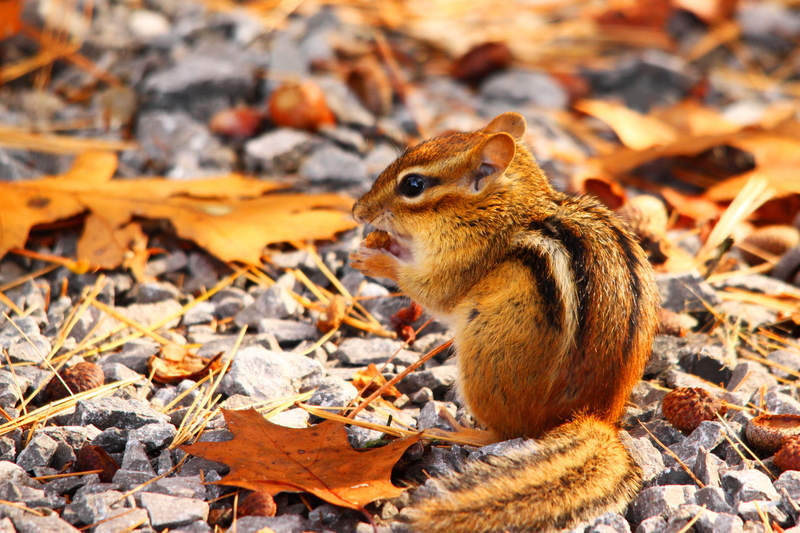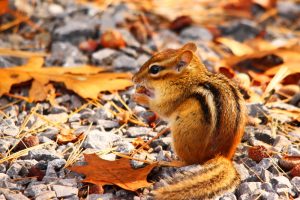Chipmunks are rodents in the squirrel family and share similar qualities, like having cheek pouches to store food. Their cheeks can expand three times larger than their head. They can gather about 165 corns in one day.
While they don’t create as much damage as a squirrel, their behaviors can lead to holes in swimming pool liners, collapsed retaining walls, and unstable foundations. They are omnivores, eating insects, plants, nuts, seeds, fruits, and small vertebrates, dig holes in your lawn, and create burrows up to three feet each. They have separate tunnels for various activities, like denning, storing food, and giving birth. Some tunnels may be directly under your garden, where they will destroy crops.
Chipmunks dig two types of burrows. One is shallow, a space where they can hide while foraging during the day. The other is deep and extensive for storing food and living in the winter.
How to Keep Chipmunks Out of Your Yard
You must find ways to keep chipmunks out of your yard. Making your property less attractive to chipmunks is more effective than trapping or hunting them simply because you aren’t preventing other chipmunks from invading your space in the future. Plus, there is no need to harm the rodent when you can get it to leave safely.

Natural Chipmunk Control and Exclusion
The number one reason chipmunks are on your property is that you have a food resource they can access. Gardens without physical barriers, bird feeders, and fruit and nut trees are examples of food resources. Bird baths and small ponds are great water sources. The first step you can take is to remove access to food and water sources. The following techniques will help.
- When planting gardens and flower bulbs, put hardware cloth or wire mesh above the seeds or bulbs. The plants will still grow through, but everything underneath is protected.
- Remove piles of wood, logs, rocks, or clutter from your yard since they provide excellent shelter for chipmunks.
- Place barriers on your bird feeders to prevent chipmunks from getting the seeds.
- Properly store pets and livestock feed. Secure garbage cans.
- Fill burrows with soil and place a rock or heavy object over the entrance.
- Seal all access points to your home if chipmunks are an inside nuisance.
Do Electronic Chipmunk Deterrents Work?
Electronic methods do not involve electricity. It is the technology that makes electronic deterrents effective. Some use ultrasonic vibrations or sounds to scare away chipmunks. Others use blasts of water or automatic sprinklers. Avoid devices that flash bright lights to scare an animal. Chipmunks are active during the day, so the lights would not be effective. Some machines use batteries, some need to be plugged in, and others use solar panels.
Chipmunk Decoys
Chipmunks are afraid of owls and hawks. You can purchase a fake owl and place it in the areas where chipmunks are active. Put it in a natural place, like on a tree limb or fence post. Owls don’t typically sit on the ground, but you can still place one there. You can choose between mechanical decoys that move, flap their wings, or make noises. They may cost more money than the decoys that sit still, but it is worth it if chipmunks are causing major damage.
Decoys are usually plastic, metal, concrete, or any material that won’t be ruined when sitting outside during the four seasons. Some find constructing scarecrows or hanging old CDs in the garden and around the yard scares away chipmunks. You may try adding empty soda cans or other materials that make noises for an added effect.
Repellents
Use natural repellents made of spices and ingredients with strong odors, such as peppermint, chili powder, garlic, and cayenne pepper. Spray predator urine around your property. Chipmunks will avoid any area where they suspect predators, like snakes, foxes, coyotes, raccoons, weasels, and cats. In some cases, human hair clippings will deter them.
Synthetic repellents are made of chemicals that are not harmful to animals but taste and smell bad to a chipmunk. They come in granules you can scatter in the soil where chipmunks are causing damage. You may also apply non-harmful chemical sprays to plants, crops, and trees.
Landscaping Tricks
Chipmunks use hedges and plants around your home and yard to hide as they roam the property. To keep chipmunks from burrowing under your home, prevent plants from growing close to it. Dig a three- to four-inch trench around your home and fill it with gravel as a barrier. Some people install L-shaped footers around their homes, driveways, sheds, and gardens.
Plant smelly plants, such as herbs, around your yard strategically to deter chipmunks. Plants with thorns that poke or scratch chipmunks can help. You may also want to wrap the bases of fruit and nut trees or around shrubs with aluminum foil or wire mesh. Finally, opt for container gardening around your home instead of planting directly in the ground.

